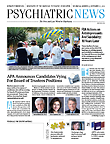In adult patients with schizophrenia, treatment with clozapine alone instead of antipsychotic polypharmacy was associated with reduced disease-specific emergency department use and with reduced disease-specific and all-cause health care costs.
That’s the key finding from a direct comparison of clozapine monotherapy and antipsychotic polypharmacy in nonelderly adult Medicaid beneficiaries being treated for schizophrenia published online October 15 in Psychiatric Services in Advance.
Dawn Velligan, Ph.D., of the Department of Psychiatry at the University of Texas Health Science Center at San Antonio and colleagues used data from the Medicaid MarketScan database to study disease-specific and all-cause hospitalization, emergency department use, and Medicaid payments. All patients were aged 18 to 64, initiated treatment between July 2006 and January 2009, had continuous Medicaid coverage from six months before through 12 months after treatment initiation, and had a diagnosis of a schizophrenia disorder.
A total of 479 patients were treated with clozapine monotherapy, and 2,440 were treated with antipsychotic polypharmacy containing an antipsychotic other than clozapine. The most common polypharmacy combination was risperidone and quetiapine, followed by risperidone and aripiprazole. Combinations of the top four antipsychotic drugs used by study-sample patients (aripiprazole, quetiapine, risperidone, and ziprasidone) accounted for 65 percent of antipsychotic polypharmacy cases.
After controlling for baseline differences in comorbidity, patients treated with clozapine monotherapy were less likely than those treated with antipsychotic polypharmacy to have mental-disorder-related use of the emergency department or schizophrenia-related use of the emergency department in the 12-month period following treatment initiation; however, the clozapine group was not significantly less likely to be hospitalized or to have an all-cause emergency department visit.
But total Medicaid payments for the clozapine monotherapy group were significantly lower across all categories, with all-cause costs reduced on average by $21,233, mental-disorder-related costs reduced by $17,457, and schizophrenia-related costs reduced by $10,582.
“The potential economic and clinical implications of our findings should be considered in light of two main factors,” the authors said. “First, our sample consisted of Medicaid beneficiaries, a population in which cost-containment pressures are intensifying, the rate of antipsychotic polypharmacy is high, and the rate of clozapine use is generally low, estimated at only 2 percent of New York Medicaid beneficiaries with schizophrenia who initiated antipsychotic pharmacotherapy in 2009.”
Deanna Kelly, Pharm.D., a professor of psychiatry at the University of Maryland School of Medicine, who reviewed the report, noted that clozapine is the single most effective antipsychotic and that much more effort should be focused on maximizing its use.
“As seen in this article by Velligan and colleagues, monotherapy is more cost-effective than using two antipsychotics, a very commonly used practice with no or little evidence base,” she said. “I hope that this study may encourage more-widespread efforts to improve clozapine use and overcome current barriers.”
Kelly said that polypharmacy in treating schizophrenia is “rampant,” though it is costly and not supported by strong evidence of its efficacy. Meanwhile, clozapine has been shown in many studies to be the superior second-generation antipsychotic but is remarkably underutilized—in part because clinicians have not received training with the drug, but also because of the perceived and real challenges surrounding required weekly blood draws to monitor for agranulocytosis, of which there is a risk with clozapine.
“Certainly the cost of blood draws is only a small part of the total costs [associated with treating psychosis], and this study shows substantial reductions in overall health care costs through reduced emergency department visits,” Kelly pointed out.
“There is a movement toward greater use of clozapine that is gaining ground, but until payers step up and get involved, it will be harder to bring about change,” she added. “If payers do get involved and begin encouraging use of clozapine, it could cause a paradigm shift in our field. This study may be a good first step toward creating that shift.” ■
“Outcomes of Medicaid Beneficiaries With Schizophrenia Receiving Clozapine Only or Antipsychotic Combinations” can be accessed
here.
